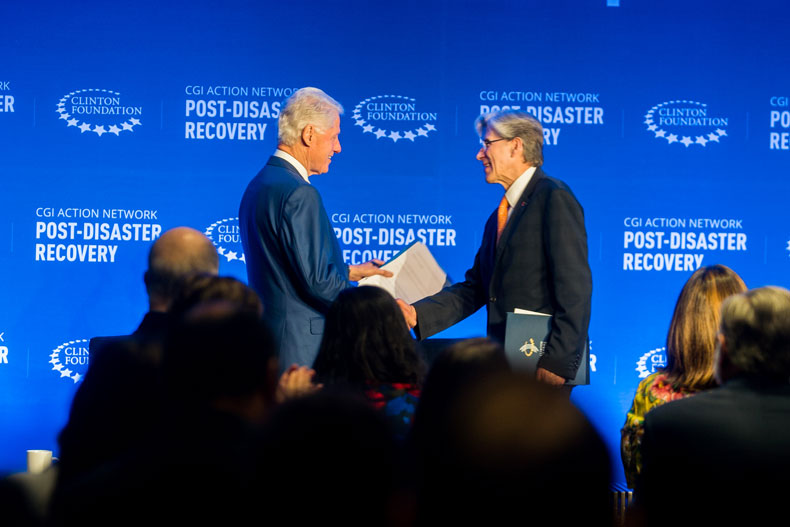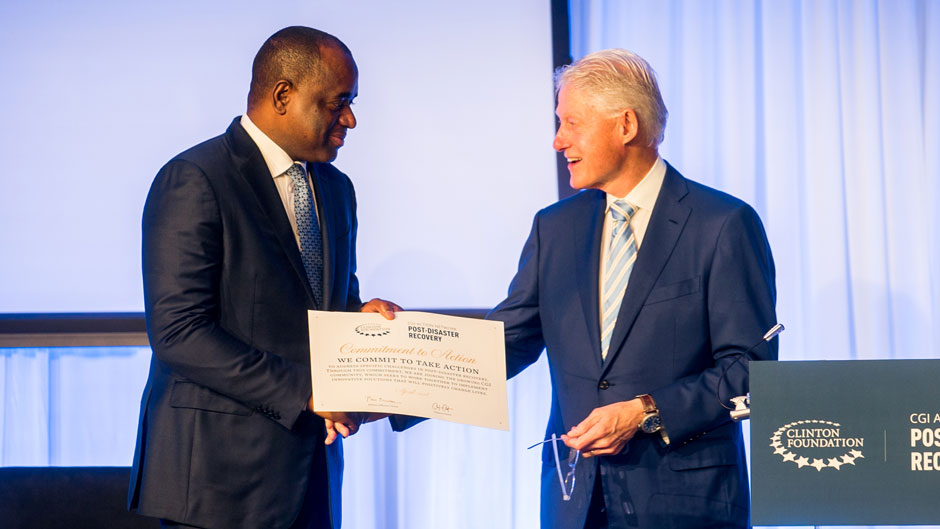A cross-section of 350 representatives from government, private sector, nonprofit, and civil organizations gathered at the University of Miami to explore partnerships to “build back a better” Caribbean region devastated by two horrific hurricanes last year.
The upcoming storm season, just two months off the horizon, is predicted to be more intense.
“The Caribbean region has many treasures, yet it’s one of the most vulnerable in terms of climate change. This is worth our saving,” former President Bill Clinton, who founded the Clinton Foundation in 2005 to facilitate partnerships capable of addressing large-scale global issues, told the audience at the April 3 meeting.
“This is a long-term engagement model, and these are real people and real stories,” he said. “I want all of you to believe that you can make a difference.”
Dominica Prime Minister Roosevelt Skerrit, whose dramatic Facebook posts—“my roof is gone, my house is flooding, I am at the complete mercy of the hurricane”—went viral as Hurricane Maria raged on the island nation, shared his insights in the “Partnering to Jumpstart Action” opening session.
Skerrit urged that rebuilding efforts in the Caribbean embrace two foundational premises—that climate change is real and that resilient systems be built. “If this can be done,” the prime minister said, “then the Caribbean can really lead the world in a whole other direction.”
Kenneth Mapp, governor of the U.S. Virgin Islands, echoed the premise. “I live climate change,” he said. “My beaches are being eroded.”

University of Miami President Julio Frenk, in welcoming the conference attendees, said that “disaster knows no borders” and cited the University’s efforts to aid its Caribbean neighbors by delivering medical supplies and expertise to impacted areas, and accommodating faculty and students from the region to study at UM.
“Like the Clinton Foundation, the University is committed to developing strategies for preparedness for disaster,” said Frenk, adding “as a hemispheric university, we’re leading the way in directing our research community to understand the social and economic impacts” of disasters.
John A. Quelch, dean of the University of Miami Business School, who attended the event, noted that the Business School is launching a Latin America and Caribbean Initiative. "We take seriously our responsibility to support higher education and entrepreneurship resiliency in the Caribbean region," he said.
Executive sessions focused on developing systems and solutions to redesign the devastated infrastructures and economies of the region, such as (Re)building Affordable, Resilient, High-Quality Housing; Addressing Trauma and Increasing Psychosocial Resiliency; Powering Up After the Storms and the Future of the Energy Grid; Supporting Small Business Recovery and Resilience, among others.
Several new projects were announced at the conference, and their scope ranged from an American Federation of Teachers partnership to send 24 nurses to the U.S. Virgin Islands to conduct health screenings to the creation of Climate Resilience Agency of Dominica (CREAD), a $600-million initiative between Dominica and partners to build the first climate resilient nation in the world.
Carmen Yulín Cruz, mayor of San Juan, Puerto Rico, cited the immense devastation and despair that continues to plague the U.S. territory and called for a “power transformation.”
“Electricity is the great equalizer, it’s like the veins that run through everything,” the mayor said. She called for new technologies to create micro-energy grids throughout the island and urged attendees to remember that the lives of real people are in the balance.
“It’s not that we have felt neglected, it’s that we have been neglected by some,” the mayor said. “It makes your heart cry that we can do so much with so little—there are so many small things that you can do to help us change our reality.”
In a video message, Puerto Rican playwright, composer and actor Lin-Manuel Miranda, who has been active in rebuilding efforts, called on attendees to “roll up your sleeves and help us work smarter and stronger for a better future.”
Rajiv J. Shah, president of the Rockefeller Foundation, announced that a report developed by an extensive cross-sector leadership team and due out in several weeks, will create a “single vision to reimagine what success will look like in Puerto Rico” and provide a blueprint for the rebuilding effort.
In plenary remarks, President Clinton highlighted how similar partnerships and cross-sector efforts aided in rebuilding New Orleans, especially in terms of housing and coastal restoration, 10 years after Hurricane Katrina devastated the city.
“We’ve seen enough devastation happen in the Caribbean,” he said. “We’ve got a chance to do something to make a difference and we ought to take it.”

